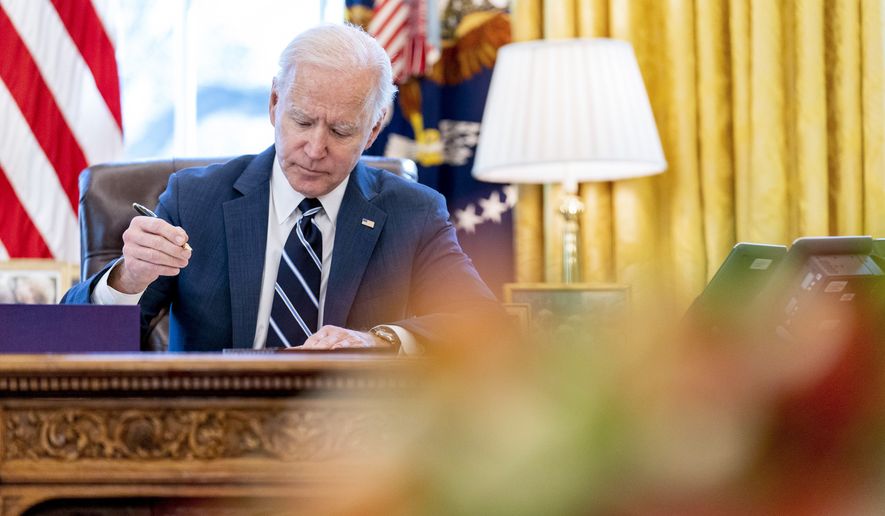President Biden’s proposals to pour more taxpayer money into government programs to counter rising costs have fiscal hawks confounded, with many arguing it will exacerbate the current inflation crisis.
Budget experts say the White House’s plan, which centers around spending $1.75 trillion over the next decade to cushion the effect of rising prices, is wildly flawed.
“With federal deficit spending already more than $1 trillion a year, Biden’s plan to increase all kinds of subsidies would just add more fuel to the inflation fire,” said Chris Edwards, the director of tax policy studies at the libertarian Cato Institute. “When the government subsidizes industries, it bloats industry costs, as we see in education, health care, and other areas.”
Economists argue that the current round of inflation that is wracking the economy results from the lingering effects of the coronavirus pandemic and the supply-chain crisis it spawned. They say COVID-19 shuttered businesses, while driving up overhead costs through public health mandates for those that remained open.
“The government exacerbated the problem with regulatory mandates that increase costs for service providers,” said Mr. Edwards.
As factories closed and international trade came to a halt, businesses still in operation were forced to hike prices even higher to account for the limited supply of goods and services, many economists say. Congress only boosted the demand for those goods and services by doling out trillions in coronavirus relief, including three direct payments to families worth upwards of $3,200.
Officially, the money was meant to stimulate an economy that was in freefall. Although that worked in theory, when coupled with the supply chain issues, the inadvertent result was far different than desired.
“Both Democrats and Republicans have dangerously inflated prices by pumping trillions into the economy since the onset of the pandemic,” said David Ditch, a federal budget analyst at the Heritage Foundation. “They essentially created a situation where too much money was chasing too few goods.”
With inflation soaring 7.9% in the past year, a high unseen in more than 40 years, economists now worry that Mr. Biden is poised to make things worse.
The White House’s plan to combat rising prices has primarily centered around repackaging Mr. Biden’s long-stalled social welfare and climate change bill as a salve for inflation. Once known as the Build Back Better Act, but now christened simply as Build Back America, the legislation would pump more than $1.75 trillion into the economy over the next decade.
Most of the money would be funneled into new programs that subsidize the cost of everything from electric car purchases to child-rearing. In the latter, for instance, Mr. Biden is proposing to reinstitute the expanded child care tax credit, which gives families upwards of $300 per month per child.
“When we invest in our workers, when we build the economy from the bottom up and the middle out together,” Mr. Biden said at his first State of the Union address this month. “We can do something we haven’t done in a long time: build a better America.”
The Congressional Budget Office estimates the legislation, which includes billions for child care subsidies and prescription drug costs, will balloon the deficit anywhere between $367 billion to $3 trillion over the next decade.
Experts contend that pumping more money into the economy will worsen inflation without addressing why costs are rising in the first place.
“When you subsidize costs, you increase demand, but the supply doesn’t always increase to keep pace,” said Mr. Ditch. “If the White House was serious about fixing inflation they would rein in spending and look for ways to boost jobs and production in the private sector.”
The White House defends its push to revive Build Back Better, arguing that it will help cut the deficit and combat inflation.
“My plan to fight inflation will lower your costs and lower the deficit,” Mr. Biden said. “Seventeen Nobel laureates in economics say my plan will ease long-term inflationary pressures.”
But fiscal hawks do not buy such claims. Republicans, in particular, say Mr. Biden is backing a typical tax-and-spend political agenda and only giving lip service to those concerned about runaway inflation.
“The foreign and domestic policies of President Biden are not working for the American people,” said Sen. Lindsey Graham of South Carolina, the top Republican on the Senate Budget Committee. “He needs to adjust his policies.”
• Haris Alic can be reached at halic@washingtontimes.com.




Please read our comment policy before commenting.